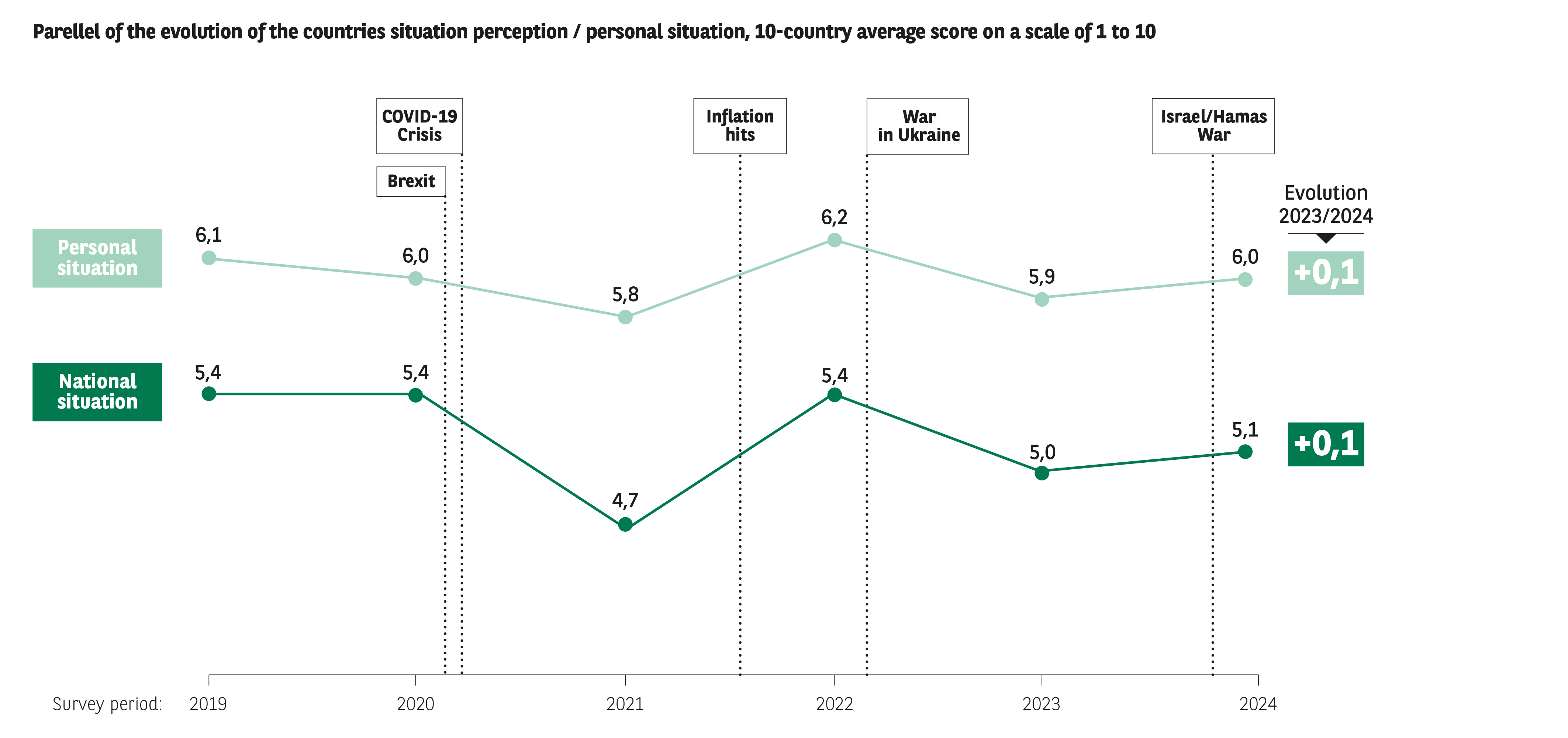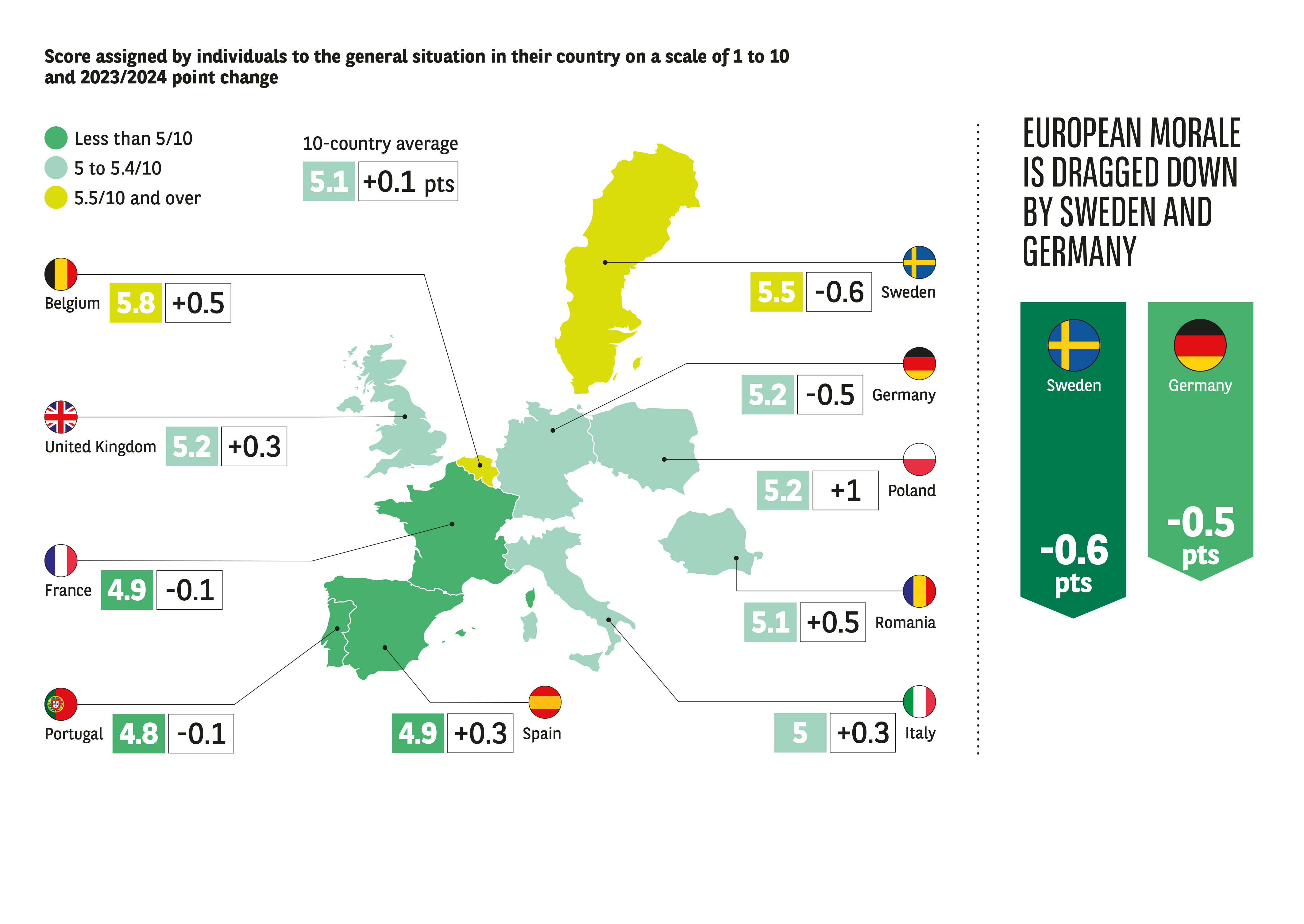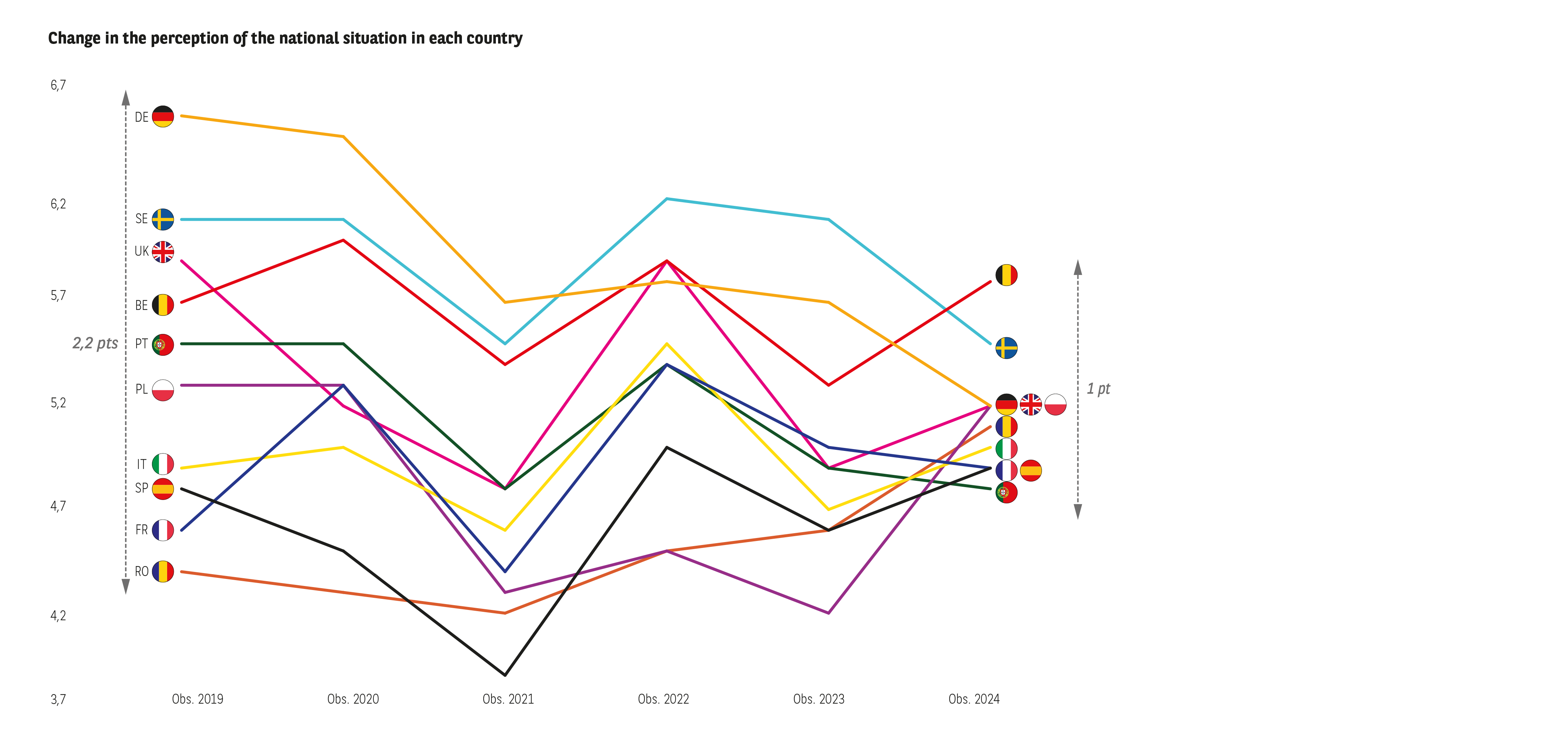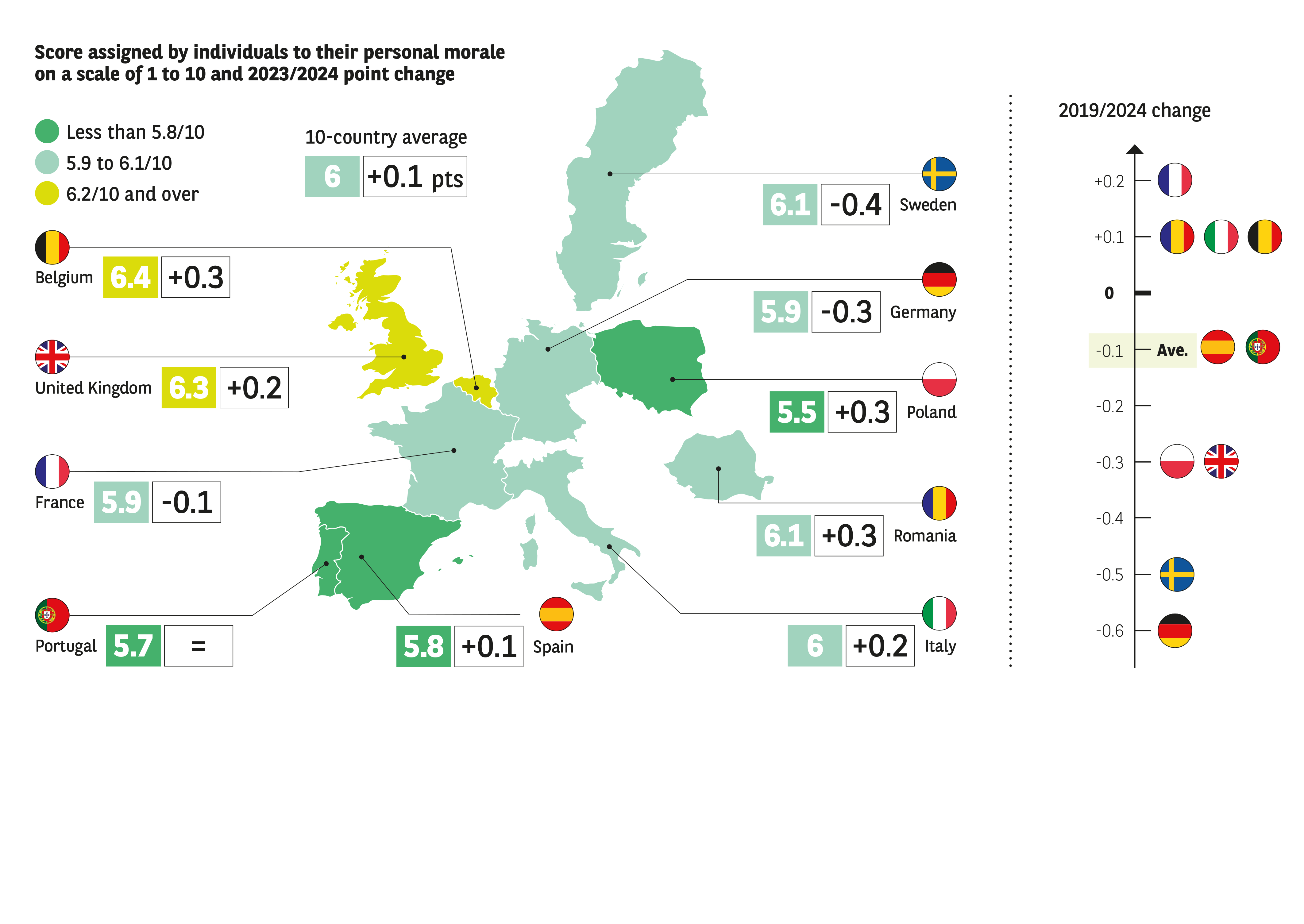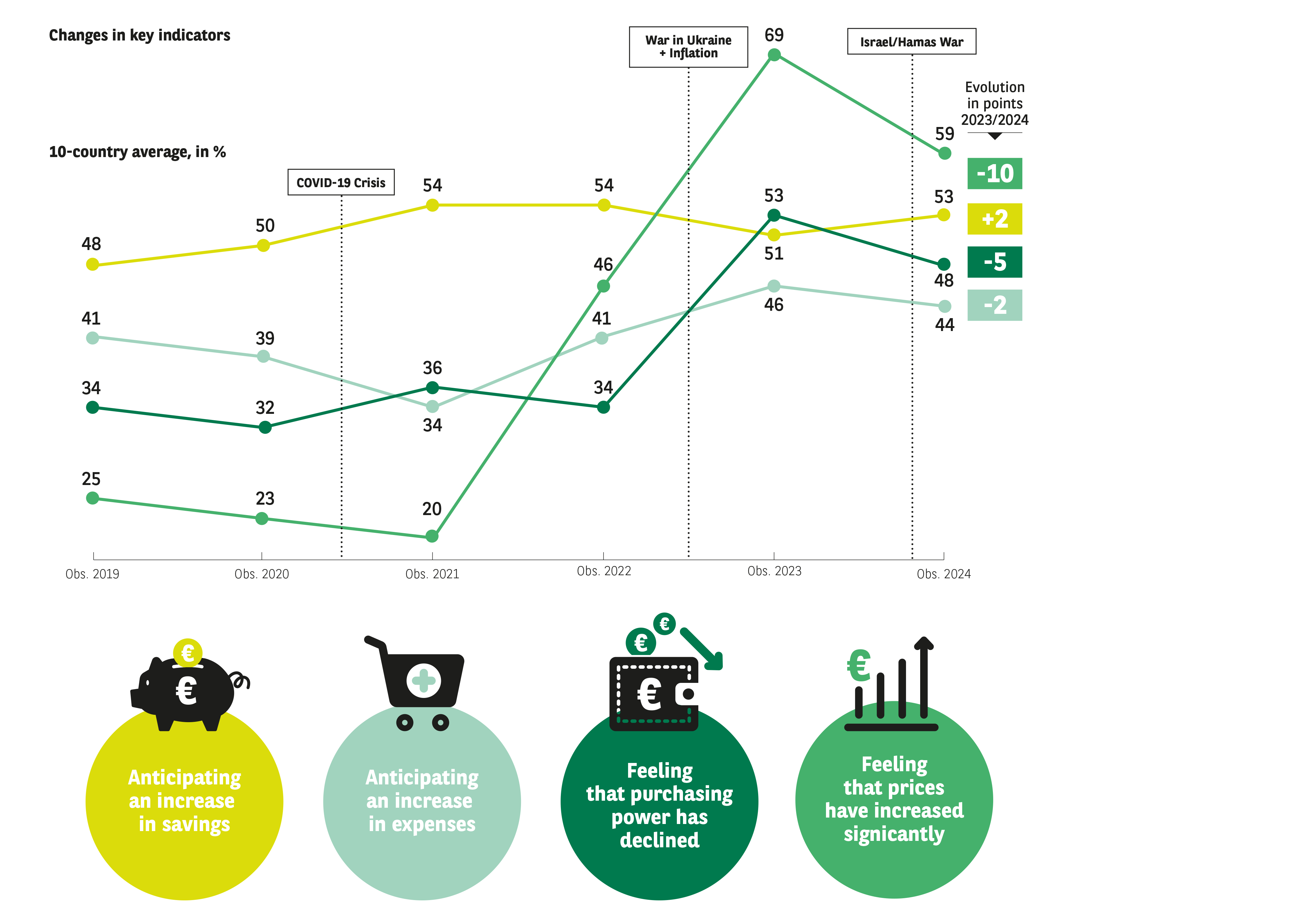MORALE AMONG EUROPEANS IS FAIRLY STABLE, BUT REMAINS DEPRESSED
Last year, after a “euphoric” post-pandemic rebound, morale among Europeans once again deteriorated overall. In the ten countries surveyed, the scores for both national situations and personal circumstances fell. The upturn was evidently condemned to be brief and the economic indicators have rendered the short- and medium-term outlook somewhat gloomy.
NATIONAL AND PERSONAL SITUATIONS… NO REBOUND IN SIGHT
As was the case in the 2023 Observatoire Cetelem Barometer, the morale of Europeans has failed to improve this year, with scores remaining virtually unchanged.
When asked to describe the general situation in their country today, Europeans report no significant improvement. The average score across all the countries stands at 5.1 / 10, i.e., 0.1 points up on last year (Fig. 2). This score of only just over 5.0 means that morale remains below the pre-Covid-19 level (5.4), clearly highlighting the persistent concerns of households regarding the future.
As is customary in the Observatoire Cetelem Barometer, the pessimism of Europeans is not as pronounced when we look at their assessment of their personal circumstances. Indeed, while this score also remains stable, having risen by 0.1 points year on year, at 6.0/10 it is on a par with the pre-pandemic figure. Although, as ever, individuals score their personal circumstances more highly than the general situation in their country, this return to normality reflects their ability to adapt to the context and to re-establish a personal equilibrium, despite current economic constraints.
NATIONAL SITUATIONS ACROSS EUROPE ARE BECOMING MORE HOMOGENEOUS
As we have just seen, Europeans remain downbeat when it comes to assessing the general situation in their country. But this overall result fails to capture the stark variations in the trends observed from one country to the next (Fig. 3a). In many cases the score has improved over the last year, such as in Poland (+1.0 points), Romania and Belgium (+0.5 points), and to a lesser extent in the UK, Spain and Italy (+0.3 points).
At the other end of the evolution scale, two countries have seen their score drop. Sweden and Germany post the strongest declines, slipping by 0.6 and 0.5 points respectively. These appraisals echo the economic contraction taking place in both countries.Because of the size of its economy and population within the European Union, the situation in Germany negatively impacts the perceptions of Europeans as a whole. Meanwhile, pessimism still reigns in France, whose score has dropped 0.1 points to 4.9/10. The same trend can be witnessed in Portugal, with a score of 4.8.
If we look back over the last 5 years, we can see that the scores for the overall situation in each country are converging and drawing closer together. (Fig. 3b). Thus, Germany and Sweden, which topped the ranking in 2019 with scores of 6.6 and 6.1 / 10 respectively, achieve similar scores in 2024 to those of the other European countries surveyed. In contrast, Romania, which posted the lowest score in 2019 with 4.4/10, has caught up with the European average this year.
In the end, among the 10 countries surveyed, the gap between the highest and lowest scores is just 1 point in 2024, compared with 2.2 points in 2019.
So why are these scores converging? It’s obviously impossible to draw any firm conclusions, but the successive crises of recent years have had a global impact, affecting not just one country, but the planet as a whole, and the European continent in particular. It makes logical sense that the countries that were the “healthiest” have been hit the hardest.
REGARDLESS OF EVERYTHING, PERSONAL CIRCUMSTANCES HOLD FIRM
In terms of individual morale, which tends to follow the fluctuations of national situations, most countries have returned to pre-Covid-19 levels, with the average lying just 0.1 points down compared with that period (Fig. 4a). Once again, the scores posted by Germany and Sweden stand out, having dropped by 0.6 and 0.5 points respectively in five years. The 2024 edition of the Observatoire Cetelem Barometer accounts for half of this fall, with scores down 0.3 and 0.4 points respectively in the two countries. But they are not alone in seeing their personal circumstance scores slip. Indeed, the UK and Poland are also in the red, with both posting declines of 0.3 points. However, the causes are probably very different in these two cases. Of course, like other European economies, theirs have been hit by inflation and the rising cost of living. But Brexit has exacerbated the situation for British consumers.
The effects have been such that the majority of the population is now in favour of holding a referendum on the question of rejoining the European Union. Meanwhile, the ongoing war in Ukraine has caused personal circumstance scores in Poland to fall significantly.
The worst is behind us! That may be what Europeans are thinking. After an unprecedented public health crisis, geopolitical tensions stemming from the war in Ukraine and its consequences, in the form of soaring energy and food prices, gave rise to fresh fears. One year on, Europeans have organised themselves and put in place strategies to adapt to these new circumstances. Indeed, the improvement in the UK’s personal circumstance score reflects this. Thus, the toughest period appears to be over for consumers.

